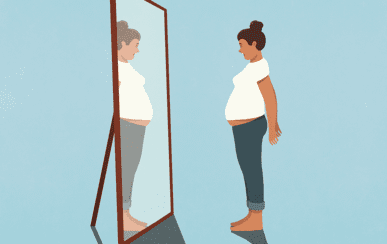Feeling a little bloated? It’s something that most of us have experienced at one time or another after we’ve overindulged or when something doesn’t quite agree with us.
Sometimes called a “food baby,” it’s that uncomfortable, but all too common, feeling when our midsection feels stretched and puffy. What causes bloating in the first place? And how can we reduce it?
Bloating happens when the gastrointestinal tract becomes distended with gas. Signs and symptoms may include feelings of abdominal swelling, fullness, or hardness accompanied by excessive gas, burping, and sometimes cramping. Bloating may also result from swallowing excess air (for instance, if you eat too quickly, chew gum, or tend to talk a lot while eating), eating foods you don’t tolerate well, or drinking carbonated drinks. It may also be due to constipation or slow gut motility (the speed at which food travels through your digestive tract).
Thankfully, there are simple ways you can manage the pain and discomfort of bloating—and prevent it from happening in the first place.
Go for a walk. Physical activity can get the bowels moving more regularly, which can help to release excess gas and stool. Getting the bowels to move is especially important if a person is feeling constipated. A walk around the block can often provide some quick relief.
Try abdominal massage. Massaging your stomach can also get your bowels moving. A massage that follows the path of the large intestine is especially helpful. To do this, place your hands just above the right hip bone and rub in a circular motion with light pressure toward the right side of the rib cage. Next, rub straight across the upper belly area towards the left rib cage. Make your way slowly down toward the left hip bone. Repeat as often as needed.
Gradually increase fiber intake. Eating more fiber can help prevent constipation and bloating. However, most people don’t get enough fiber in their diets. The recommend amount for men is 38 grams per day. Women should consume 25 grams daily. Why gradually? Eating too much fiber too quickly can cause even more gas and bloating. Some of our favorite high-fiber foods include apples, avocados, pears, raspberries, and strawberries. Try to work some of these fiber-rich foods into your diet each day, but be sure to pace yourself.
Take a probiotic (and a prebiotic!). Adding a clinically studied probiotic supplement to your daily routine can help your beneficial bacteria flourish and can keep harmful microbes in check. This can also help to manage gas, bloating, and other minor gastrointestinal issues.1 Look for a probiotic that is shelf-stable, which means it can safely be stored at room temperature.
A prebiotic can be helpful too. Prebiotic supplements and prebiotic-rich foods are high in special types of fiber that support your digestive health. They promote the increase of friendly bacteria in the gut and help to maintain a healthy digestive system. Prebiotics are found in lots of fruits and veggies, especially foods that contain complex carbohydrates. The body can’t digest them so they pass through the digestive system to become food for your bacteria.
Keep a food diary. Food intolerances are responsible for many cases of excessive gas and bloating. Bloating is common in people who are lactose intolerant and can’t digest the sugars in dairy products. For people whose bloating typically happens after meals, keeping track of food and drink intake for several weeks can help determine whether specific foods are responsible.
Most of the time, bloating is due to minor issues that lifestyle changes or over-the-counter treatments can resolve. But if belching, gas, or bloating interferes with your daily activities, we recommend asking for guidance from your primary care physician.
References
- Didari T, Mozaffari S, Nikfar S, et al. Effectiveness of probiotics in irritable bowel syndrome: updated systematic review with meta-analysis. World Journal of Gastroenterology. 2015; 21(10): 3072-3084.
This article is for informational purposes only. This article is not, nor is it intended to be, a substitute for professional medical advice, diagnosis, or treatment and should never be relied upon for specific medical advice.

Share this Post